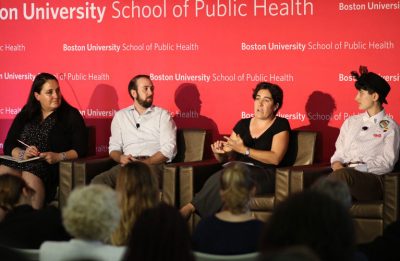
Transgender individuals in Massachusetts may be legally required to use public accommodations designed for their sex at birth in a few months. A couple years after Massachusetts passed an anti-discrimination law permitting people to use accommodations of their gender identity, the law may be repealed.
Sandro Galea, dean of Boston University’s School of Public Health, responded to the potential repeal in a note published Sept. 7, solidifying BU’s stance as a supporter of transgender rights.
“In this crucial moment in the fight for transgender equality, it is important to remember that the eyes of the country are on what we do here in Massachusetts,” Galea wrote.
The essay, titled “The Fight for Transgender Rights Is a Fight for Health,” detailed the school’s official support of Yes on 3 — a campaign working to uphold the 2016 Massachusetts transgender anti-discrimination law.
The Massachusetts law permits individuals to use public accommodations that align with their gender identity and prohibits discrimination. This includes bathrooms, stores, doctor’s offices and restaurants. The bill will remain in effect if the majority of voters vote “yes” on the Nov. 6 ballot.
In accordance with this initiative, SPH hosted a Dean’s Seminar to discuss the upcoming vote with a panel of experts from the transgender community Wednesday. In a conversation moderated by BU SPH professor Sophie Godley, panelists Mason Dunn, Iris Olson and Jennifer Siegel discussed their positions to an audience of students, faculty and community professionals.
Dunn, executive director of the Massachusetts Transgender Political Coalition, promoted the original anti-discrimination bill in 2011 that guaranteed protections to transgender individuals in the realms of education, credit and lending, housing and employment.
“If the ‘no’ side wins out, if we strip human rights, I think that that would be a really crushing blow,” Dunn said in an interview, reiterating the panel’s mutually agreed designation of Question 3 as an issue of human rights. “It will be a real message to me as a trans person of how this state views me and views my community and views my work for trans rights and trans equality.”
The MTPC Director currently works with the Yes on 3 campaign alongside Olson, who is an activist fellow at SPH tasked with engaging the community in conversations about public health, particularly in the areas of sexuality and gender. This includes the organization of Wednesday’s panel, which provided desserts, voter registration forms, pride stickers and pronoun buttons to all attendees.
Olson, whose shirt was adorned with a “they/them/theirs” pin alongside a large “Vote yes on 3” sticker, said to the audience, “A lot of the people who we interact with on a daily basis, you may not know that we’re trans, but we’re here, and we’re present. And part of being a community is to help those around you.”
Olson said to the audience that Boston may be seen as progressive, but without the protections of the anti-discrimination law, “It’s going to be a really scary place.”
They added that they also fear for the safety of their transgender friends in their “less progressive” home state of Ohio, particularly those who are non-white, because they predict the ramifications of the upcoming vote on Question 3 won’t be limited to one state.
Olson stressed the importance of voting, explaining that the assumption that Massachusetts will always vote blue provides a false sense of security.
Dunn and Siegel reemphasized Olson’s point, both recalling their experiences of living in the “liberal” state of California during the passage of Proposition 8 in 2008. That measure, which revoked the legalization of same-sex marriage in the state, Dunn said, resembles the current discussion around the stripping of transgender rights in Massachusetts.
Audience members such as Anna Mckay, 46, of Canton, also urged others in the crowd to vote during a question-and-answer portion. She shared in an interview that her child, who is transgender and not yet of voting age, has felt marginalized and alone since the 2016 election.
“I will do anything I can to advocate for their equal rights,” she said of her teenager. “Yes on 3 is the only way. There is no debate.”
Siegel, medical director at the Center for Transgender Medicine and Surgery at Boston Medical Center and a “recovered non-voter,” said she sees similar cases of mental distress and illness in her transgender patients regularly. Loss of equity is tied to worsened mental and physical health, she said, in addition to potentially setting a dangerous precedent.
As a longtime member of the LGBT community, Siegel said in an interview that the upcoming vote is “close to home.” She noted that while she hadn’t noticed any outward changes since the anti-discrimination motion was passed in 2016, the withdrawal of protections would likely have a greater impact.
“It’s really remarkable how, when you start to think about [the law] going away, you have to reflect on the privilege of what you have,” she said.
CORRECTION: A previous version of this article stated Massachusetts passed an anti-discrimination law permitting people to use accommodations of their gender identity seven years ago. The law was passed in 2016. An updated version reflects this correction.























































































































